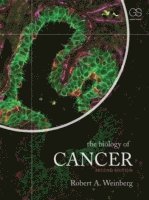
- Format
- Häftad (Paperback / softback)
- Språk
- Engelska
- Antal sidor
- 960
- Utgivningsdatum
- 2013-05-24
- Upplaga
- Second International Student Edition
- Förlag
- Garland Publishing Inc
- Illustratör/Fotograf
- 800 colour illustrations
- Illustrationer
- 583 Illustrations, color
- Dimensioner
- 278 x 213 x 32 mm
- Vikt
- Antal komponenter
- 1
- Komponenter
- CDROM
- ISBN
- 9780815345282
- 1952 g
The Biology of Cancer
Kundrecensioner
Fler böcker av Robert A Weinberg
-
On Dialogue
David Bohm, Robert A Weinberg
-
Biology of Cancer
Robert A Weinberg, Robert A Weinberg
-
Computers Of Star Trek
Lois Gresh, Robert Weinberg, Lois H Gresh, Robert A Weinberg, Robert E Weinberg
-
One Renegade Cell
Robert Weinberg, Robert A Weinberg, Robert A Weinberg
Recensioner i media
"The book fulfills its purpose and is, indeed, a must-read for students of cancer biologyIt includes updated information and concepts in cancer research that justify replacing the previous edition." - Doody Reviews "This publication represents an exhaustive and detailed coverage of the field of basic oncology oriented toward a student audience, and it continues to set the highest example of excellence in the field of undergraduate and graduate oncology." - The Quarterly Review of Biology "Clearly, not only is it an authoritative text book on the complex biology of cancer, it serves as an invaluable reference document for individuals working in biomedical laboratories as well as professionals involved in day to day management of cancer in the clinics." - Oncology News Praise for the First Edition of THE BIOLOGY OF CANCER by Robert A. Weinberg: There is no comparable text in cancer biology - Nature The Biology of Cancer is no doubt the definitive statement on its topic today. - Science Here, at last, we have a definitive textbook specifically devoted to the molecular and cell biology of cancer. - Bioscience Education Overall, this is a remarkable achievement that is by far the most comprehensive coverage of this field available. - Times Higher Education Supplement
Övrig information
Robert A. Weinberg is a founding member of the Whitehead Institute for Biomedical Research. He is the Daniel K. Ludwig Professor for Cancer Research and?Professor in the Massachusetts Institute of Technology (MIT) Department of Biology.?His research is focused on the molecular and cellular mechanisms of cancer pathogenesis.?He was awarded the U.S. National Medal of Science in 1997.
Innehållsförteckning
CONTENTS 1. The Biology and Genetics of Cells and Organisms 2. The Nature of Cancer 3. Tumor Viruses 4. Cellular Oncogenes 5. Growth Factors, Receptors, and Cancer 6. Cytoplasmic Signaling Circuitry Programs Many of the Traits of Cancer 7. Tumor Suppressor Genes 8. pRb and Control of the Cell Cycle Clock 9. p53 and Apoptosis: Master Guardian and Executioner 10. Eternal Life: Cell Immortalization and Tumorigenesis 11. Multi-step Tumorigenesis 12. Maintenance of Genomic Integrity and the Development of Cancer 13. Dialogue Replaces Monologue: Heterotypic Interactions and the Biology of Angiogenesis 14. Moving Out: Invasion and Metastasis 15. Crowd Control: Tumor Immunology and Immunotherapy 16. The Rational Treatment of Cancer
